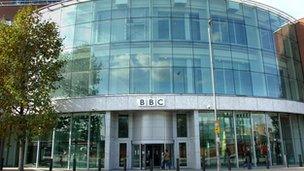Viewpoint: Can personal service companies save you tax?
- Published

Some people employed by the BBC are paid through public service companies
The use of personal service companies by some apparent employees of public service organisations, such as the BBC, has been criticised by MPs on the Public Accounts Committee.
But there is a myth here.
The truth is that the overall tax take from using a PSC may not be that far removed from what you as an individual might pay under pay-as-you-earn (PAYE).
The use of personal service companies by some apparent employees of public service organisations, such as the BBC, has been criticised by MPs on the Public Accounts Committee.
The truth is that the overall tax take from using a PSC may not be that far removed from what you as an individual might pay under pay-as-you-earn (PAYE).
The biggest savings are in fact to the employer, because they do not need to suffer the burden of the employers' national insurance contributions (NIC).
Let me show what we mean with some numbers. The income in this case is taken as £200,000.
Someone being taxed at source as a conventional employee under the PAYE system would pay income tax at 20%, 40%, and 50%, amounting to £74,074.
There would be a clawback of their personal allowance on their earnings above £100,000, amounting to £3,242, and also national insurance payments of £7,337.
That equals £84,653, leaving them £115,347.
Now what about someone taking their £200,000 income through a PSC?
Firstly, the company would pay 20% corporation tax, or £40,000.
If the remaining £160,000 was taken as a dividend, the most tax-efficient way of using this arrangement, then the person would have a tax liability of £34,241 as income tax on their dividends.
This would be levied at nominal rates of 32.5% and then 42.5%, but reduced by a 10% notional tax credit, and with charge for the clawback of the personal allowance.
When added to the corporation tax that would amount to tax paid of £74,241.
In turn, that would leave them with income of £125,758, which is more that the person on PAYE.
As far as the individual is concerned, they suffer £84,652.90 tax and NIC under PAYE and £74,241 income tax and corporation tax using a PSC.
In this simple example, I have not taken into account expenses, such as running costs, which might be deductible in the company, thus reducing the dividend.
So in this simple example I have shown a potentially higher figure for dividends than may occur in real life.
In other words, the amount in the individual's pocket could in some cases be less using a PSC than paying tax under PAYE.
Why do people bother? For some there is a genuine saving, for others not.
As I said at the beginning, the real cost saving is to the employer, in terms of employer's NIC.
In this same example, the employer paying someone £200,000 under PAYE would pay £26,567 in NIC.
If they "encourage" someone to accept payment via a PSC, then there is no employer's NIC to pay at all.
**************************************************************************************************************************************
This corrected version of this article was published on 8 October 2012. The original, published on 5 October 2012, contained an error, failing to reflect the availability of a 10% tax credit for people receiving dividends, which reduces the income tax bill for people using a PSC.
- Published5 October 2012
- Published25 May 2012
- Published2 February 2012
- Published1 February 2012